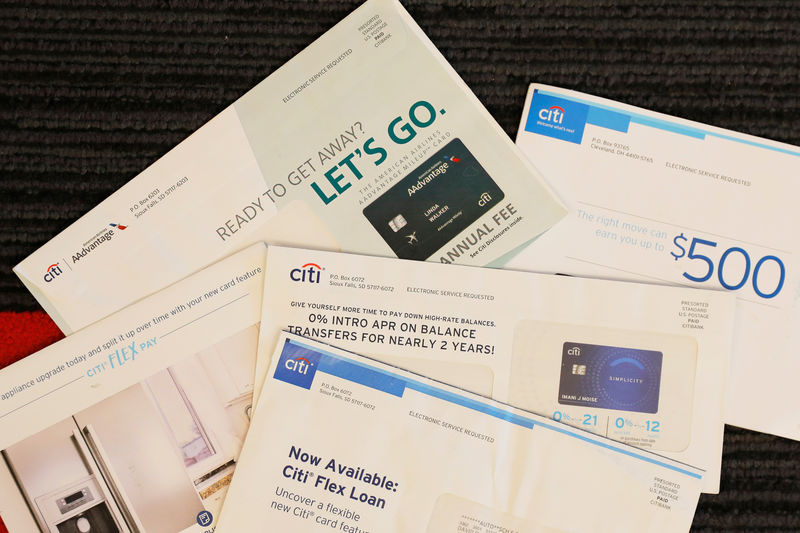By Imani Moise
NEW YORK (Reuters) - Despite signs that the U.S. economy is slowing, New York-based Citigroup Inc (N:C) is betting big on credit cards.
Citigroup, the third-largest U.S. card issuer, according to payments industry publication The Nilson Report, has been among the most aggressive promoters of zero-interest balance transfers.
For a small fee, customers can move debt from a rival card onto Citi's plastic and pay no interest for 21 months. That is currently the longest 0% deal in the industry, according to consumer finance company Bankrate LLC. Rivals offer 15 interest-free months with no fee.
The card business now accounts for nearly one-third of Citigroup's overall revenue and is one of the biggest potential drivers of future earnings growth.
But some analysts and investors worry this portfolio could become a liability if the economy goes south. The bank continues to advertise zero-interest deals on popular personal finance websites and through mailers, even as competitors have scaled back.
"Just recognizing where we are in the credit cycle, it's interesting to see Citigroup doubling down and pushing forward," said Moody's analyst Warren Kornfeld.
Credit card customers who use balance transfers are considered higher risk because they often use the easy financing to accumulate more debt, according to bank analysts and credit underwriters.
Wall Street's worst fears lie with borrowers such as Jacqueline Alvarado, a Pennsylvania truck driver who now owes $12,000. Over the past five years, Alvarado says she has moved balances around on 19 cards, including one from Citigroup, to avoid finance charges. If the promotional offers dry up, she said, so do her hopes of paying off that debt.
Zero interest is "the only way I can stay afloat," said Alvarado, 40.
In interviews with Reuters, Citigroup executives defended their card strategy and tough underwriting standards they say will protect the bank from major losses in the event of a downturn.
Citigroup's card business has reported delinquency rates far below the industry average in recent years, according to federal data and filings. In addition, 83% of consumers in its American credit card business, excluding its retail partnership cards, have credit scores of 680, which is considered a good score, according to credit rating firm Experian.
(For a graphic on Citigroup's credit card delinquencies and charge-offs, see: https://fingfx.thomsonreuters.com/gfx/editorcharts/CITI-CREDIT%20CARDS/0H001QES3826/index.html)
TEMPTING BORROWERS
Citigroup counts on customers sticking around after the promotional period expires. With annual percentage rates of up to 27% on its cards, the profits on borrowers who carry balances can be juicy.
The strategy so far is paying off. Interest-bearing balances rose 10% in the second quarter versus the year-ago period. That growth helped boost overall profits on consumer lending by 9%.
Anand Selva, the bank's head of consumer strategy, said he expects the business to continue picking up steam.
Citigroup shares have rallied more than 20% so far this year. The KBW Banking Index, the benchmark stock index for the U.S. banking sector, rose 6% over the same period.
Selva says Citigroup has taken other steps to encourage cardholders to do more than transfer balances. For example, it has sweetened its reward program by offering a new credit card that rounds up to the nearest 10 reward points on every new purchase. And it has introduced installment loans linked to credit lines for large purchases.
Major card rivals, meanwhile, are proceeding more cautiously.
Discover Financial Services (N:DFS), known for flooding mailboxes with promotions, has said on analyst calls that it is paring those offers and tightening personal loan underwriting over concerns the economy is slowing. Capital One Financial Corp (N:COF), which pioneered balance transfers in the early 1990s, similarly told analysts and investors it has become more conservative in extending credit lines while targeting wealthier clients who typically do not carry balances.
Bank of America Corp (N:BAC) and JPMorgan Chase & Co (N:JPM), two of the biggest card lenders, have grown their businesses by prioritizing affluent consumers over people already carrying credit card debt, according to analysts.
CARD CRUTCH
Citigroup has leaned more on its card business since the 2007-2009 financial crisis. The bank required three government bailouts when its U.S. subprime mortgage business turned toxic and caused it to shrink its portfolio to stem losses.
It sold its retail wealth management unit to Morgan Stanley (N:MS), and it no longer engages in traditional mortgage and auto lending. Citigroup now has one-fifth the number of U.S. branches as its primary competitors.
So it has turned to its card business to drive growth and lure deposits.
The bank now earns more than half of its consumer profit and revenue from cards. And it markets online checking and savings accounts to its 28 million cardholders. Doing so helped Citigroup add $2 billion in consumer deposits during the first half of 2019. That is more than double what it gathered all of last year.
Analysts said the business will be a bright spot for Citigroup - as long as the economy remains healthy. U.S. banks suffered $87 billion in losses on credit card loans from 2009-2010 in the wake of the financial crisis, according to a Federal Reserve report.
Alvarado, the truck driver, said she has been slowly chipping away at her balance thanks to 0% financing.

"This works out for me for now, until they change it," she said.